Internationally acclaimed classical musicians Christie Julien and Alexander Markov have announced their groundbreaking new project called Baroque to Rock, a concert that bridges the works of classical masters with the energy and showmanship of rock music to be performed at the iconic Carnegie Hall on October 22.
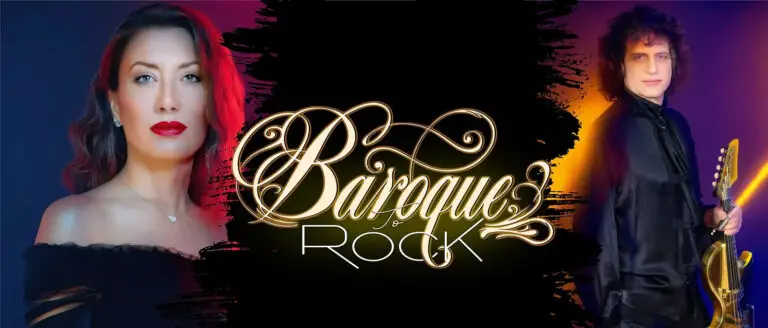
Following this exciting announcement, NYS Music had the opportunity to discuss the project, its origins and roots in both artists’ lives, and what’s to be looked forward to in this one-of-a-kind musical evening bridging classical and rock and roll music.
Previous collaborators and seasoned musicians in their own rights, Christie Julien and Alexander Markov’s partnership for Baroque to Rock is an especially exciting one given their respective backgrounds and musical experiences.
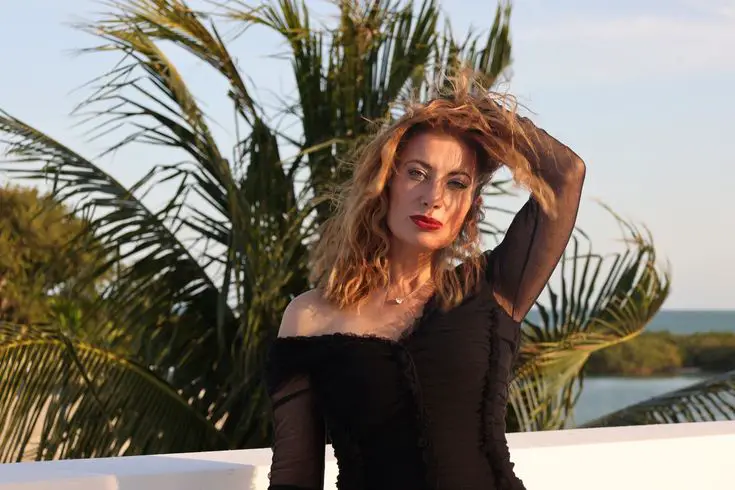
An internationally renowned concert pianist, Christie Julien has toured the world countless times performing throughout China, Japan, South America, Europe and The United States. Graduating from the Peabody Conservatory with a prestigious Artist Diploma under the tutelage of pianist Leon Fisher, Julien is a decorated pianist with several prizes in solo and chamber performance, including first place in both categories in the renowned Conservatoire National Supérieur de Musique et de Danse in Paris.
Having performed some of the most iconic historical venues in her home country of France such as the Theatre des Champs-Elysées, Maison de Radio France in Paris, the Nouveau Siècle, Palais de Congres, and the host of annual concerts at Salle Gaveau, Julien specializes in the French repertoire but finds great joy in performing works across the musical spectrum.
All of Christie’s accomplishments as a pianist are rooted in a lifelong love for music as a whole. When asked about where her fascination with the art form began, Julien described an idyllic scene of her six year old self sitting in a tree in her backyard in the south of France for hours at a time with nothing but the company of a small radio next to her.
Her love story with the piano in particular began after a neighbor had to pass along a piano prior to moving away. The piano found its way into Julien’s home, and she was instantly enamored by its elegant simplicity, explaining that, “You could do the melody on the piano by itself and it was simple. There is something very humble about the way you can do a sound on the instrument.”
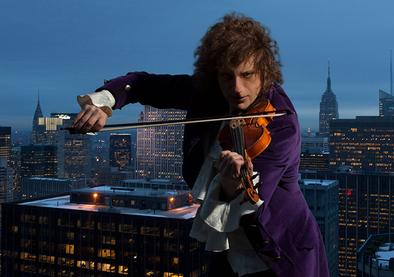
Markov has been around classical violin since his youth, being taught by his father, concert violinist Albert Markov, who he still performs alongside to this day. With a largely 19th century romantic virtuoso repertoire, Markov has toured the world several times over as one of the modern violin greats.
After making his Carnegie Hall debut back in 1983, Alexander Markov’s decorated legacy thus far has accumulated in a gold medal at the Paganini International Violin Competition, solo performances alongside the Philadelphia Orchestra, BBC Philharmonic, Orchestre de Paris, the Montreal Symphony, and the Budapest Festival Orchestra, in addition to the title of one of the only violinists ever to perform the entirety of the 24 Paganini Caprices in a singular recital, among many other feats.
These accomplishments among many others culminate in Markov’s iconic gold plated violin, custom made by James V. Remington and Barry Lipman. Born out of a lifelong love for rock music and the realization that there was a “void to be filled” in the electric violin world of a recognizable public figure, Alexander’s violin made of real gold paired with a bow that glows comparably to a lightsaber bridges this gap all while creating an iconic instrument that can evolve into a larger symbol for the electric violin akin to the custom-made guitars or drum sets for rock and roll icons.
Setting out to create an instrument that “didn’t just sound rock and roll, but looked the part,” the striking gold violin has become a Markov staple and will be appearing at the October 22 performance of Baroque to Rock.
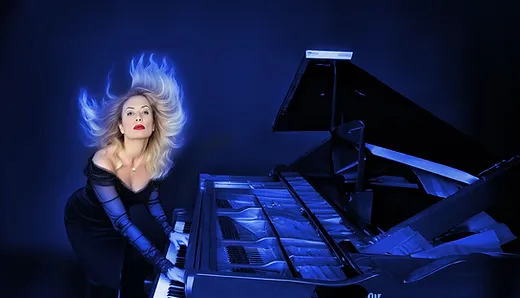
An evening that bridges the works penned by the likes of Vivaldi, Chopin, and Beethoven among many others with the electric performance quality and spirit of rock and roll, Baroque to Rock is an entirely unique marriage of two musical worlds that almost seem to be opposite extremes.
Through a playful attitude and a broadened perspective of composition- not written with either rock or classical in mind but with the full breadth of all possible instrumentation and technique from the genres combined- the evening is to be a once in a lifetime live experience that is a love letter to music as a whole and what it can accomplish when labels like genres begin to blur or fall away entirely.
Baroque to Rock as a concept was formed out of Julien and Markov’s individual experiences with the genres and how the interactions between sounds expanded their horizons.
When asked about how rock was introduced to their classical lives, the pair’s answers were entertaining in the best of ways. Alexander admits that “when I came to America, I was not into rock and roll at all. In fact, I used to hate rock and roll.” He had moved to the United States for high school, and the experience ended up being eye-opening.
“… Something clicked. I found this whole new genre and that kind of opened the doors in my mind outside of where I came from- that cocoon. There is so much else, and there’s a great bonus… when you open your door, your musical imagination to other genres, you really start to become a better musician and you see from a much bigger perspective.”
– Alexander Markov
Christie’s side of the story takes root in a surprise concert she held for her husband at their wedding where she performed alongside various other musicians over the course of 25 minutes for their 444-guest ceremony. The set began as expected with a standard classical piece that was familiar and “nice for the ears,” and then suddenly Christie was standing on her piano, the other instrumentalists were on their chairs, and alongside Markov’s striking electric violin skills the performance took a surprising turn into exciting rock and roll covers.
After the unforgettable evening, Julien found herself consistently approached by people who were present at the wedding asking about when they would perform something like that again- and the idea for this collaboration was born.
Conversation over the hypothetical set list quickly grew. Julien discussed a distancing from the more strict works like 40-minute sonatas that were beautiful to hear but lacked the spark they were looking for, instead leaning into “something that is fluid, something that goes with a different atmosphere so we could travel in time.”
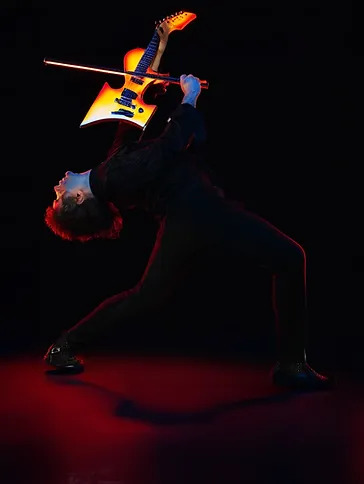
The two proposed pieces that generally contained a more deeply inspired sound, searching for something that was “expressing something much more than just the instrument” as Julien put it- hence works from ballets like Prokofiev’s Romeo and Juliet and the Khachaturian Sabre dance of Gayane. Baroque to Rock is not meant to make the audience simply sit their seats, it instead aims to capture how music does not have to exist within the confines of refined airs and stiff attitudes when music’s greatest power is to make people feel.
This removal of social confines allowed for the traditionally classic works to be reimagined without boundary or fear of staying true to what’s written on paper. Both musicians excitedly would embellish or alter the pieces where they felt additional or entirely new instrumentation could be added- treating the full breadth of classical and rock writing styles, motifs, and techniques not as separate selections but one expansive toolset.
Baroque to Rock’s appeal is just that- both Julien and Markov are artists that value the power of music as a whole over convention. The event has no singular audience- folks of all ages, backgrounds, and life experiences will be able to attend and experience the essential truth of music as an art: it communicates and connects in a way where just words, or sometimes words entirely, fail. There is no “requirement” of previous knowledge or experience to attend a classical concert, especially not one crafted especially to show the world that music is something every single human being can enjoy.
Tickets for Baroque to Rock have extremely reduced prices for a Carnegie Hall show starting at just $14 thanks to generous donors who agree with the sentiment that there should be no bar from live music, including price range. In addition, profits from the evening will be dedicated to supporting music education initiatives in underserved communities and uplifting the creative exchange between the United States and France through partner organizations savethemusic.com and villa-albertine.org.
Tickets for this once in a lifetime genre-bending experience are available now- you can visit the event’s page for more information and purchasing opportunities here.


Comments are closed.